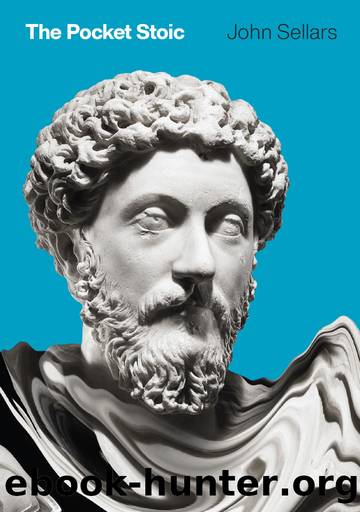The Pocket Stoic by John Sellars

Author:John Sellars [Sellars, John]
Language: eng
Format: epub
Tags: PHI000000 Philosophy / General
Publisher: University of Chicago Press
Published: 2020-10-06T00:00:00+00:00
05
Our Place in Nature
In comparison with Senecaâs, the life of Marcus Aurelius was relatively calm. Although his father died when he was very young, he was adopted into the imperial family as a teenager, and eventually became Emperor in AD 161, a month before his fortieth birthday, remaining so until his death in 180. His reign is widely considered to be one of the better periods of Roman imperial history, although for Marcus much of it was spent at war on the northern fringes of the Empire shoring up its borders. It was towards the end of his life, while on campaign in Germania, not far from modern-day Vienna, that Marcus kept a notebook in which he wrote to himself in an effort to process the experiences of each day and to prepare himself for the next.
His Meditations have attracted countless readers since they were first printed in the late sixteenth century, from Frederick the Great to Bill Clinton. But they have not appealed only to people who, like Marcus, have found themselves struggling with the pressures of leadership at the highest level. Anyone can pick up his book and find inspiration, such as the young man who wrote to me once to comment, âIâm 23, life is hard and confusing, donât know my purpose, Marcusâs Meditations helped me a lot.â He is but one of many who have found the Meditations a helpful, if not life-saving, source of guidance. One of the reasons for this, I think, is that readers find they can identify with Marcus, who comes across as all too human, grappling with the pressures of daily life, workplace responsibilities and social gatherings. Marcus might have been Roman Emperor, and subsequently might have gained a reputation as a wise Stoic philosopher, but the reality we encounter in the Meditations is simply a late-middle-aged man doing his best to cope with the demands of life.
One of the central themes that threads itself through the Meditations is fate. This brings us back to Epictetusâs concern with control. Marcus had read the Discourses as a young man, and their influence can be seen throughout his own writings. But whereas Epictetus turned his attention inwards, to focus on what we can control, Marcus looked outwards to contemplate the vastness of what we cannot. Again and again Marcus reflects on his own life as but one tiny moment in the vastness of time, and his own body as a mere speck in the vastness of the universe:
Download
This site does not store any files on its server. We only index and link to content provided by other sites. Please contact the content providers to delete copyright contents if any and email us, we'll remove relevant links or contents immediately.
The remains of the day by Kazuo Ishiguro(8961)
Tools of Titans by Timothy Ferriss(8357)
Giovanni's Room by James Baldwin(7313)
The Black Swan by Nassim Nicholas Taleb(7097)
Inner Engineering: A Yogi's Guide to Joy by Sadhguru(6780)
The Way of Zen by Alan W. Watts(6589)
Asking the Right Questions: A Guide to Critical Thinking by M. Neil Browne & Stuart M. Keeley(5749)
The Power of Now: A Guide to Spiritual Enlightenment by Eckhart Tolle(5740)
The Six Wives Of Henry VIII (WOMEN IN HISTORY) by Fraser Antonia(5493)
Astrophysics for People in a Hurry by Neil DeGrasse Tyson(5172)
Housekeeping by Marilynne Robinson(4432)
12 Rules for Life by Jordan B. Peterson(4298)
Double Down (Diary of a Wimpy Kid Book 11) by Jeff Kinney(4257)
The Ethical Slut by Janet W. Hardy(4235)
Skin in the Game by Nassim Nicholas Taleb(4231)
Ikigai by Héctor García & Francesc Miralles(4228)
The Art of Happiness by The Dalai Lama(4118)
Skin in the Game: Hidden Asymmetries in Daily Life by Nassim Nicholas Taleb(3985)
Walking by Henry David Thoreau(3948)
